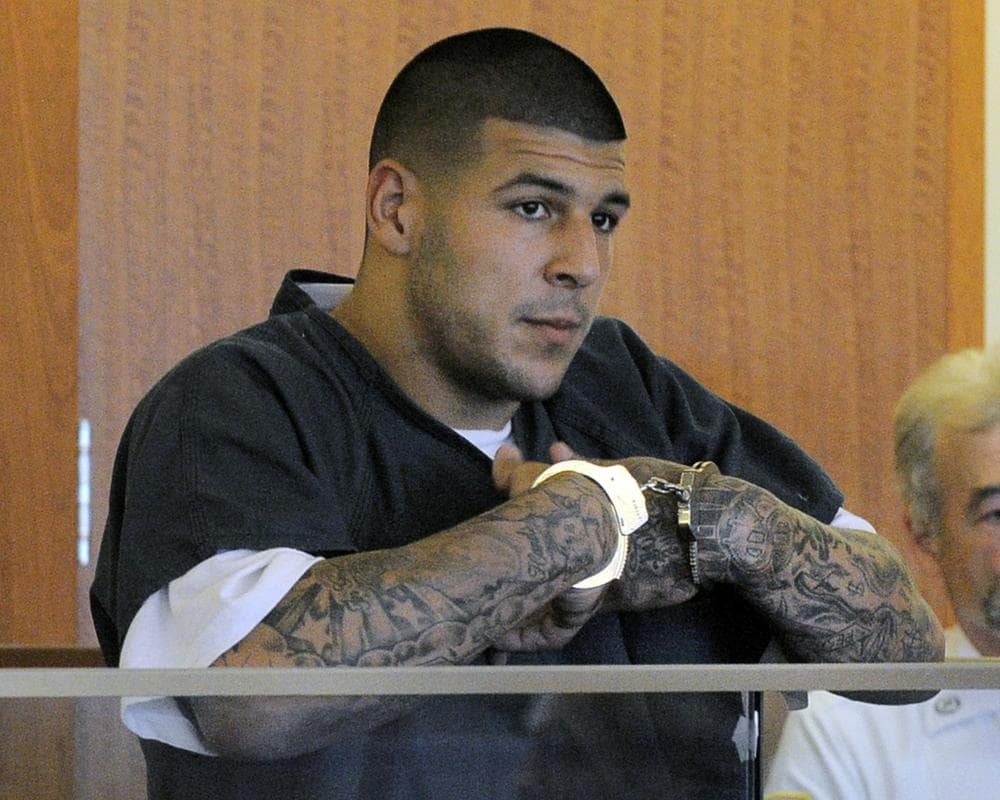Advertisement
In Depth
Benedict: Hernandez's Troubles Point To Trend
Resume
Journalist Jeff Benedict has spent more than two decades studying the link between football and crime. He has performed comprehensive criminal backgrounds checks on thousands of athletes, first for his book Pros and Cons and again as part of a 2011 Sports Illustrated article. Benedict says his research shows a pattern of poor behavior in athletes. He spoke with Bill Littlefield about that pattern and how it applies to former Patriots tight end Aaron Hernandez.
“Where he fits in is the fact that he has a past. Pretty typically, NFL players who end up on the wrong side of the law during their pro career have been on the wrong side of the law in college,” Benedict said. “There’s a pattern of that. It’s not often that an NFL player just suddenly goes bad one day and goes off the rails. Usually there are telltale signs. His pattern seems consistent with that.”
Elements of Hernandez’s past include the alleged shooting of a drug dealer in February, an arrest during his freshman year at Florida for a fight in an off-campus bar, and a one-game suspension the following year for a failed drug test.
Benedict says Hernandez's talent provided him with chances galore; first from Urban Meyer, whose Florida Gators won a national championship, and now with Patriots' coach Bill Belichick.
“There’s no question that talent plays a role here," Benedict said. "When draft day comes and NFL executives are making decisions on how to expend these very valuable top draft picks, the thing that keeps them up at night and that they struggle with the most is not on-field talent, it’s not health, it’s not speed. It’s character.”
The Patriots' gamble on Hernandez had paid off enough for the team to sign him to a five-year contract extension worth a as much as $40 million last summer. But, in Benedict's eyes, all that money isn’t always good.
“The NFL gives these guys three things that are very dangerous. 1. A lot of money. 2. A lot of discretionary time. And 3. an incredible amount of adulation. When you put those things together, for a guy who’s had trouble in the past, that can be a formula for big problems in the NFL.”
When he first started researching athletes in trouble with the law, Benedict says willful ignorance was the norm in all sports. Today, the landscape is more encouraging.
“Teams and leagues are very well aware of the scope of the problem they know it better than anyone. And they’ve actually taken many steps to address it. They haven’t licked it, but they’ve done a lot to address it."
Roger Goodell took over as commissioner of the NFL in 2006. Benedict sees that year as a turning point for the league.
"I think everyone would agree he’s more focused on this Paul Tagliabue ever was. And he’s laid down the law in a number of areas that I think have been good,” he said. “I think this case, the Aaron Hernandez case, is probably going to propel the commissioner to go even deeper than he already has."
Benedict draws a parallel between crime committed by athletes and the NFL's concussion crisis. Both, Benedict says, reach deep into the community.
“The NFL is no longer viewed as this game that we watch on Sundays. There are ramifications to these games: physical ramifications for those who play it and consequences for those in the game who have issues off the field.” Benedict said.
This segment aired on June 29, 2013.